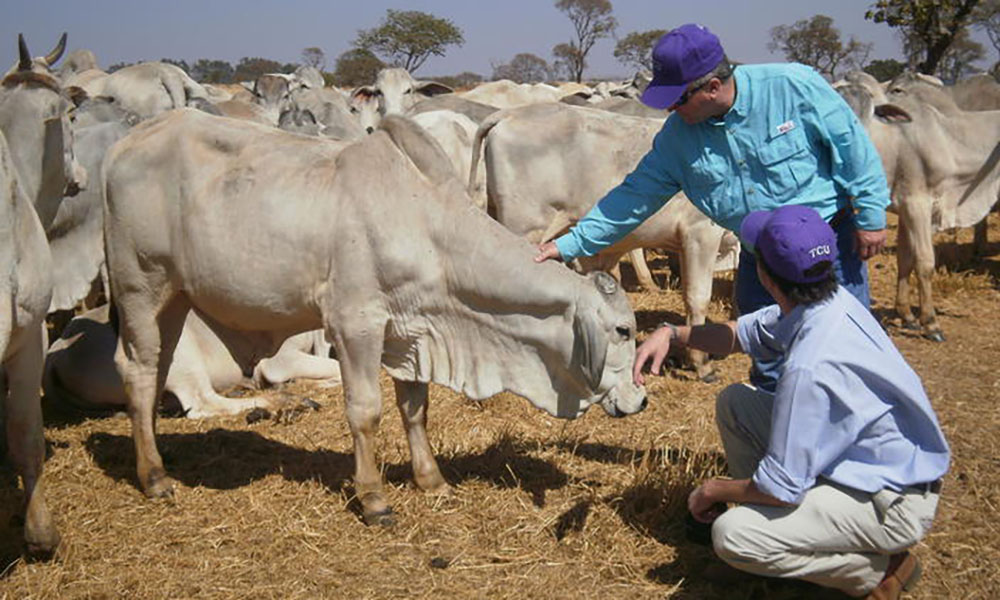Partnerships
With a strategy to combine business education with instruction in new technology and agricultural practices in the field, the Institute provides much-needed training in developing economies while fostering strong business and personal relationships that straddle oceans and time zones.
 The Institute’s model is unique and flexible; it is based on the applied science and
hands-on management training that are fundamental to the Ranch Management Program.
As such, the Institute can effectively respond to the needs of particular locations
and individual organizations.
The Institute’s model is unique and flexible; it is based on the applied science and
hands-on management training that are fundamental to the Ranch Management Program.
As such, the Institute can effectively respond to the needs of particular locations
and individual organizations.
Brazil
The Novo Santo Project is a collaboration between the Institute of Ranch Management at TCU, Alianca da Terra and Novo Santo Antonio Cattlemen Association (Apepasa). The project started in January of 2015 with an initial meeting and a follow up agreement by all parties to a five year project designed to teach the fundamentals of ranching. The TCU team would provide the teaching curriculum and instructors for five separate courses. Alianca’s role provides technical support by mapping designated ranches and supplies a technician on the ground to meet with the producers. Apepasa has 15 to 20 producers that are actively involved in the project. The participants are primarily smaller beef producers with approximately 10 to 200 cows, including a few producers that hand milk select cows for cash flow.
Areas of Focus:
AGRICULTURAL PRODUCTION, BIODIVERSITY, EDUCATION, GRAZING MANAGEMENT, PRODUCER EXCHANGE,
SOIL HEALTH, SUSTAINABILITY
Goal:
To collaborate with the livestock producers of the Novo Santo Antonio region in a
five year plan aimed at increasing productivity and sustainability. Sustainability
will be measured by three key components: ecological, economical and enjoyable for
the next generation.
Ghana
The Institute has partnered with the Adidome Cattlemen’s Association to teach a series of courses for cattle producers. Each course is progressive and builds on the prior course with the primary objective of improving economic yield and increasing production. Benchmarks are set prior to each course to gauge improvements in efficiency and production levels attained during the course and after completion.
Areas of Focus:
AGRICULTURAL PRODUCTION, BIODIVERSITY, EDUCATION, GRAZING MANAGEMENT, SUSTAINABILITY
Goal: Provide educational and technological tools to increase economic productivity and sustainability.
Panama
The Institute has been an integral partner in the establishment of a relationship between the TCU Global Academy and the City of Knowledge (Ciudad de Saber) in Panama. The TCU Global Academy is an interdisciplinary academic experience in which teams of students and faculty explore global realities through partnerships with international NGOs.
Area of Focus:
EDUCATION
Goal:
To provide TCU students an interdisciplinary look at study abroad by focusing on the
discovery of solutions to global issues.
The Institute of Ranch Management provides educational classes and student exchanges between TCU and the University of Panama. Classes offered are abbreviated versions of courses taught in the TCU Ranch Management program. Each year, new students participate in the educational program.
Areas of Focus:
EDUCATION, STUDENT EXCHAGE, SUSTAINABILITY
Goal:
To provide academic services and introductory courses for the cattle and agricultural
sectors in the Republic of Panama and in Latin American regional markets in order
to improve agricultural and sustainability practices.
The Institute of Ranch Management offers a series of professional development and training courses for Panamanian cattlemen based on the principles of the TCU Ranch Management program.
Topics covered include:
- Concepts of profitability, opportunity costs, business planning
- Enterprise analysis
- Record keeping for ranches
- Sensitivity analysis
- Management techniques
- Establishing a “cow budget”
Areas of Focus:
AGRICULTURAL PRODUCTION, EDUCATION
Goal:
To offer ongoing professional training tailored to the specific needs of the National
Cattlemen’s Association of Panama and to provide access to producer exchanges between
the two countries.
Fellows:
Craig Cowden and Jessica Cowden
This partnership’s purpose is to formulate and then teach a course for dairy and dual producers in order to increase economic productivity and milk production. We intend to design a year long, four-part course that addresses the needs of producers in Panama with the intention of expanding into the rest of Central America. Each quarterly part of the course will be progressive and build on the prior one. We will set benchmarks at the beginning in order to gauge improvements in efficiency and production levels from the start of the course to the end and after completion. Participants will have the opportunity to participate in interactive projects during the year and will receive a certificate upon completion of the course and assignments.
Areas of Focus:
AGRICULTURAL PRODUCTION, EDUCATION, SUSTAINABILITY
Goals:
- Provide educational and technological tools to increase economic productivity.
- Increase interaction between IPAGAL and small scale Panamanian dairy producers.
- Expand into other Central American countries with a well-established course template.